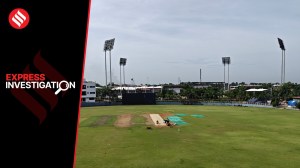Forcible narco test illegal,as bad as torture
The Supreme Court today ruled forcible intrusion into a persons mind using scientific investigative tools like narco-analysis....
The Supreme Court today ruled forcible intrusion into a persons mind using scientific investigative tools like narco-analysis,polygraph tests and Brain Electrical Activation Profile (BEAP) as illegal,calling them as cruel,inhuman and degrading a treatment as the blood-letting and broken bones associated with third-degree methods used in interrogation.
In a blow to investigating agencies which routinely use these methods,a three-judge bench of Chief Justice of India K G Balakrishnan and Justices R V Raveendran and Dalveer Bhandari held in a 251-page judgment that the involuntary administration of these three investigative tools was in direct conflict with the constitutional right against self-incrimination.
We hold that no individual should be forcibly subjected to any of the techniques in question,whether in the context of investigation in criminal cases or otherwise. Doing so would amount to an unwarranted intrusion into personal liberty, the court observed.
The bench also felt that the questionable scientific reliability of these techniques comes into conflict with the standard of proof beyond reasonable doubt,which is an essential feature of criminal trials.
While leaving room for the voluntary administration of the three techniques provided there are safeguards in place the court added that the confessions of suspects obtained even then would not be admitted as evidence because the subject does not exercise conscious control over his responses during the administration of the test.
The court was deciding on a bunch of petitions filed by several accused persons,including Godmother Santokhben Jadeja and Arun Gawli,against the use of narco-analysis,brain-mapping and lie-detector tests on them as part of investigation.
If we permit the forcible administration of these techniques,it could be the first step on a very slippery slope as far as the standards of police behaviour are concerned, the Supreme Court said,adding that it was a must to recognise the importance of an accuseds right to the choice between remaining silent and speaking.
The scientific tools do not find a mention in the criminal statutes,but there is no statutory prohibition against them too, the court said. It is a clear case of silence in the law.
The court also felt that the techniques were a violation of personal liberty as the administration of the tests entailed physical confinement of the subject.
The apex court dismissed the pleas of various state governments,represented by then Solicitor General G E Vahanvati,that the three scientific methods should be supported in public interest as an expression of desirability for efficient investigation in criminal cases.
To an argument that scientific tools like these help preserve the sovereignty and integrity of India,security of the State and public order,the court replied that these were merely hypothetical situations.
It was suggested that if investigators are allowed to rely on these tests,the result would help uncover plots,apprehend suspects,prevent armed attacks and locate bombs. The dilemma is whether it is justifiable to use torture or other improper means for eliciting information which could help in saving the lives of ordinary citizens.
The court said though arguments on public safety merit consideration,it is ordinarily the task of the Legislature to arrive at a pragmatic balance between the competing interests of personal liberty of the accused and public safety.
As a Constitutional court,the bench said there is no ambiguity about the prominence and clarity of the right against self-incrimination.
The acceptance of the three techniques would prejudice the mind of the trial judge when the case comes to court and impede its fact-finding role,the judges also felt. This would lead to further stigma for the victim.
On the argument that the scientific tools were a softer alternative to third-degree methods in custody,the court said: This is a circular line of reasoning since one form of improper behaviour is sought to be replaced with another…. What this will result in is that investigators will increasingly rely on the impugned techniques rather than engaging in thorough investigation.
The court said the widespread use of third-degree interrogation methods is a separate problem and deserves a long-term solution.
The court disagreed with the governments contention that administration of such scientific techniques amounted to medical examination of the accused,saying Parliament was well aware of the existence of the impugned techniques but deliberately chose not to enumerate them.
- 01
- 02
- 03
- 04
- 05































